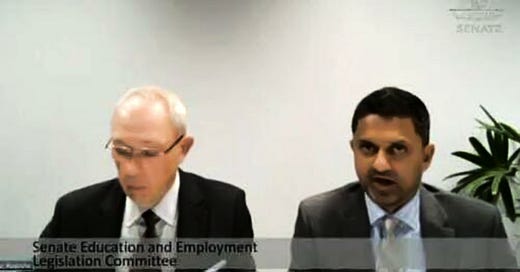Challenging Pfizer and Moderna's Evasive Responses in Australia: Uncovering the Hidden Truth
Pfizer employees received a special batch of vaccines, different from those distributed to the public
As a physician specializing in health policy research and analysis, my objective is to analyze the responses of Pfizer and Moderna executives during the recent hearing in the Australian Senate and previously in the European Parliament.
The Senate Education and Employment Legislation Committee held a hearing in Australia on a bill called: COVID-19 Vaccination Status Bill, which examines discrimination based on a person's vaccination status.
Australian Senator Malcolm Roberts led this hearing on August 3, 2023. Previously, a similar hearing was held in the European Parliament. As we examine this situation, it is imperative to transcend the superficial narratives and seek a deeper understanding of the medical and ethical implications that these evasive responses have.
The tense hearing in the Australian Senate committee highlighted the puzzling response of Pfizer and Moderna executives to crucial questions.
They were questioned on policies regarding the prevention of vaccine transmission, and the answers on the safety of COVID vaccines have left the public with uncertainties and profound questions.
While Drs. Krishan Thiru and Brian Hewitt, representing Pfizer, took pains to present a picture of safety and efficacy, their responses have raised suspicions in officialdom about the transparency and integrity of the dominant discourse.
Senator Matt Canavan exemplified the community's questioning by focusing attention on the ability of Pfizer's vaccine to prevent viral transmission. The response from Pfizer Australia's chief medical officer, Krishan Thiru, highlights a one-sided focus on individual safety, to the detriment of a comprehensive assessment of transmission prevention.
Previous statements by Pfizer CEO Anthony Bourla about uncertainty regarding transmission in vaccinated individuals point to notable contradictions in the responses provided by Thiru.
Despite Pfizer's tweets alluding to the role of the vaccine in stopping transmission, Thiru's allegation about his lack of knowledge raises serious concerns about the consistency and veracity of Pfizer's public assertions.
It should be recalled that before the committee, MEP Bob Ross posed a fundamental question to Janine Small, Pfizer's president of global markets: before marketing the vaccine, had they conducted studies to determine whether the vaccine could stop the spread or transmission of the virus? Janine Small's answer was a resounding "NO".
This revelation calls into question the official narrative and underscores the need to dig deeper into the evasive answers previously presented by Pfizer and Moderna executives.
This direct admission, made under oath from Pfizer's president of global markets, shines a critical light on Pfizer's public claims about the efficacy of its vaccine.
The lack of specific studies to assess transmission undermines public confidence in the integrity of the information provided by the company. At a time when prevention of transmission was crucial to implementing covid passes, Small's disclosure raises significant questions about the scientific basis and veracity of Pfizer's claims.
As we delve deeper into the arguments presented by these executives, we must consider expert voices and scientific evidence that contradict their responses and shed light on a possible government cover-up scheme.
The responses of physicians Krishan Thiru and Brian Hewitt, representing Pfizer, at the hearing before the Australian Senate committee sought to address concerns about the safety and efficacy of COVID-19 vaccines. However, their evasive and contradictory answers raised more concerns than conceptual clarity. In this context, it is crucial to mention the senators in Australia who played a key role in this inquiry:
Senator Matt Canavan, who emphasized the importance of viral transmission prevention and challenged claims of vaccine effectiveness in transmission prevention, spoke out.
Senator Gerard Rennick, challenged Pfizer's 100% effectiveness claims and questioned the safety and efficacy of the vaccine.
Senator Alex Antic, questioned Pfizer and Moderna on adverse events and their knowledge of independent analyses.
Senator Malcolm Roberts, discussed the details of Pfizer's indemnification agreement with the Australian government.
Senator Matt O'Sullivan highlighted vaccination mandates in Western Australia and raised concerns about their impact on livelihoods.
Senator Pauline Hanson engaged pharmaceutical representatives to deny that people had been subjected to vaccinations.
Unmasking the European Parliament Disclosure
Earlier, the European Parliament also emerged as a scene of relevance, as MEP Bob Ross questioned Janine Small, Pfizer's President of Global Markets, about whether pre-marketing studies had been
conducted to determine the ability of Pfizer's vaccine to stop the spread or transmission of the virus. Small's categorical answer of "NO" is shocking and directly challenges the previous narrative.
This admission undoubtedly underscores the inconsistencies between the responses of Pfizer executives and the objective facts. The lack of prior studies in this direction raises fundamental questions about the scientific basis behind Pfizer's claims and, by extension, the vaccines themselves.
The implications of this revelation resonate deeply in a scenario where prevention of transmission was a critical component in implementing Covid passports, the suspension of the Fundamental Human Right to Free Movement, as the "propaganda" claimed that the "vaccine" was effective in curbing the spread of the virus.
Effectiveness of the Vaccine in Preventing Transmission?
Rather than directly address concerns about the vaccine's ability to stop the spread of the virus, Krishan Thiru, medical director of Pfizer Australia, chose to focus on safety and efficacy for the individual recipient. However, the focus on individual safety should not divert attention from the urgent need to understand whether these vaccines have an impact on community transmission.
The spokesperson admitted during the Australian Senate hearing that Pfizer employees received a special batch of vaccine, different from what was distributed to the public
Earlier statements by Pfizer CEO Anthony Bourla about uncertainty regarding transmission in vaccinated individuals raise legitimate questions about the consistency of Pfizer's narrative.
Moreover, Pfizer's social media emphasis on the role of the vaccine in stopping transmission is at odds with Thiru's evasiveness and the lack of concrete evidence presented to the committee.
The research of our independent epidemiology experts provides an objective assessment of the available data and determines that Pfizer's claims one day stating that they did not study whether it could stop transmission and another advertising that it would stop transmission are not supported by empirical evidence.
Vaccine Mandates and Conflicts of Interest
The revelation that Pfizer imported a special batch of vaccines for its employees to avoid using government stockpiles raises questions about conflicts of interest and the motivation behind the company's decisions.
Pfizer and Moderna's avoidance of vaccination mandates and their impact on people's livelihoods also raise suspicions about these companies' concern for the safety and well-being of the population.
Brian Hewitt of Pfizer claimed that there are no forced vaccinations in Australia, which provoked One Nation leader Senator Paulina Hanson into an angry and outraged response, claiming his responses were "pathetic and arrogant."
The intervention in the European Parliament, where Janine Small admitted that Pfizer had not studied whether the vaccine could stop the spread or transmission of the virus, further challenges Thiru and Hewitt's evasive claims. This admission directly contradicts previous statements by Pfizer executives about the vaccine's ability to stop transmission and highlights a lack of transparency in communicating with the public and authorities.
Furthermore, Thiru's emphasis on safety and efficacy for the individual recipient, rather than addressing concerns about preventing community transmission, appears increasingly untenable in light of Janine Small's response. The discrepancy between the responses of Pfizer executives and the admission in the European Parliament underscores the need for immediate and thorough independent research into the actual effectiveness of these vaccines in preventing transmission.
The Australian Senate committee hearing and the disclosure in the European Parliament have revealed a questionable and reportable official narrative surrounding the safety and efficacy of COVID-19 vaccines.
The evasive responses from Pfizer and Moderna executives, combined with Janine Small's admission, raise questions about the integrity and transparency of these companies.
Future Perspectives and Considerations
In the interweaving of these hearings, a more nuanced and complex picture emerges that deserves attention.
The evasions by Pfizer and Moderna executives not only undermine confidence in the efficacy of vaccines but also raise questions about "corporate responsibility" and transparency in communicating with the public and authorities.
As a bioethicist and medical specialist, I am convinced that these discussions transcend mere political rhetoric. The public and leaders must advocate for transparency, integrity, and independent research to evaluate and validate the claims of pharmaceutical companies. In a landscape where trust in science and medicine is essential, it is my duty and our duty to seek answers and promote informed and honest dialogue that defends health and Life.
As we reflect on the elusive answers provided by Pfizer and Moderna executives in the Australian Senate and European Parliament, it is critical to not only analyze the inconsistencies and contradictions in their claims but also to consider the important medical and ethical implications of these answers.
Big Pharma executives failed to acknowledge the inability of COVID vaccines to stop transmission.
Pfizer and Moderna withheld information about indemnification agreements with the government.
As a bioethicist and medical professional, I advocate for an evidence-based approach and integrity in communicating safety and efficacy. I urge leaders and the public to question in an informed manner and engage in critical dialogue that promotes truth-informed decision-making.
We expect to receive explanations for unanswered questions by August 17, 2023.
To arrive at the truth, it is essential to consider independent scientific evidence and the opinions of experts in epidemiology, vaccine safety, and bioethics.
Only through an objective and comprehensive analysis of the available information can we hope to fully understand the COVID-19 vaccine landscape and make informed decisions in the best interest of public health.
It would never have been possible to grow or have this substack channel, without your support. Thank you for your trust. I am convinced that without your trust, none of this would have been possible. I am grateful for your subscription
Enjoy your new subscription!
I hope to give you the care and creativity you are looking for.




